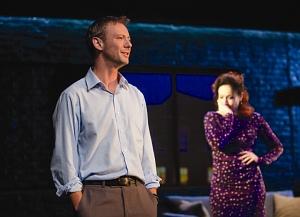Speaking in Tongues
Two couples embark on an adulterous one-night stand. One yields to temptation, the other doesn't. This is the beginning of an intricate and disorientating story that gradually unravels throughout the next two hours, revealing coincidences and connections that all come together in a fascinating puzzle.
Each pair starts off in a rather grim motel room, the opening scene of many a tale but what makes this particular play interesting is the staging of it. What should be two scenes between the separate couples unrolls simultaneously, in the same room. Overlapping dialogue leads to the discovery that each husband was tempted by the other's wife. As the characters echo each other's dialogue the loneliness and despair of the situation becomes apparent. As the slivers of different conversations collide throughout the play, the audience is left with various, sometimes radically different, perspectives about the same relationships and events. Indeed, the title alludes to this, although the married couples are talking the same language, at times they may as well be 'speaking in tongues.' The rhythm and musicality of these devices is quite beguiling and keeps the audience on its toes. It is remarkably apt for the youtube generation of short attention spans.
Betrayal, guilt, alienation and love are at the heart of the play. As the couples find themselves back at home with their respective partners the breakdown in communication becomes apparent, this is a play as much about disconnection as connections. The first half of the play ends with two half-stories, a chance glimpse into other people's lives, one is about a woman's shoe described by Jane to Peter, the other about a man's brogues found on a beach which John tells Sonja. These slow down the narrative and drag on slightly but is worth sticking them through as they become critical for the second half.
The interval is used as a turning point for the structure of the play. With the audience back in it's seats, the same actors come out as completely different characters. It is so often the case that the second half of a play does not live up to the first half's expectation but not this time. Although the second half has a completely different feel, tone and form to the first, both halves perfectly complement each other. The whole creates a sort of tangled web, an intricate thing of both beauty and danger where all the characters are connected in a complex and confounding way. Surprising? Yes. Fantastic, daring and thrilling also.
Writer Andrew Bovell does not adopt the traditional narrative structure of following a single protagonist, here all the characters have equal weight and the cast of John Simm, Ian Hart, Lucy Cohu and Kerry Fox cope admirably with the complexities of the script. Fox shows great fragility as a wife embarking on an adulterous relationship and the uneasiness she projects left me perturbed. Simm is noteworthy in his transformation from wary cop Leon to the glum and slightly simple Neil. Hart, who has three roles to play, portrays intimate moments of extreme emotional pain. Cohu moves seemlessly from seductive yet confused wife to authoritative yet inwardly troubled shrink. In the programme, Bovell is quoted as saying: "life is about a series of complex and often messy encounters which constantly change our direction." And much like in life, although all the threads come together, the play is inconclusive, the resolution never comes and the audience is left to make it's own opinion. You are left with a rather uneasy sense that we are all deeply flawed.
The play is captivating, smart and well choreographed. Both set by Ben Stones and lighting by Johanna Town work together to evoke an almost film noir feel and the back projection in the second half is evocative of a Hitchcock film. Certainly, there are all the elements of a classic mystery: a woman who disappeared, a detective, infidelity, adultery, motel rooms and bars. But this play is so much more than that. Here Bovell has created an intelligent, sometimes humorous, always powerful and surprisingly real piece of theatre about the loneliness of the human condition. The characters don't realise the parallels amongst themselves and are left haunted by the glimpses they get into other peoples worlds. The audience too, is left haunted by catching a glimpse into the dark workings of Bovell's mind.
"Rewarding and purposeful...riveting and real."
Benedict Nightingale for The Times
"While it mystifies and entertains, I felt irked by its lack of cultural specificity: it seems to be happening anywhere-in-general and nowhere-in-particular."
Michael Billington for The Guardian
"A finely geared piece...enigmatic, disorientating and brutal, perhaps, but at the same time strangely tenuous."
Henry Hitchings for The Evening Standard
"A heart-stopping, heart-breaking piece of theatre."
Scott Mathewman for The Stage
"Both play and production are perhaps a touch too artily contrived for their own good - but I was hooked throughout."
Charles Spencer for Daily Telegraph
External links to full reviews from popular press
The Guardian - The Times - Daily Telegraph
Originally published on
